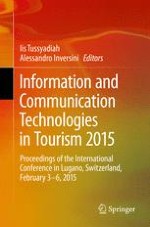2015 | OriginalPaper | Buchkapitel
“This City Is Absolutely Fun and Trendy” A Destination Brand Personality Analysis in a Web 2.0 Setting
verfasst von : Astrid Dickinger, Lidija Lalicic
Erschienen in: Information and Communication Technologies in Tourism 2015
Aktivieren Sie unsere intelligente Suche, um passende Fachinhalte oder Patente zu finden.
Wählen Sie Textabschnitte aus um mit Künstlicher Intelligenz passenden Patente zu finden. powered by
Markieren Sie Textabschnitte, um KI-gestützt weitere passende Inhalte zu finden. powered by
